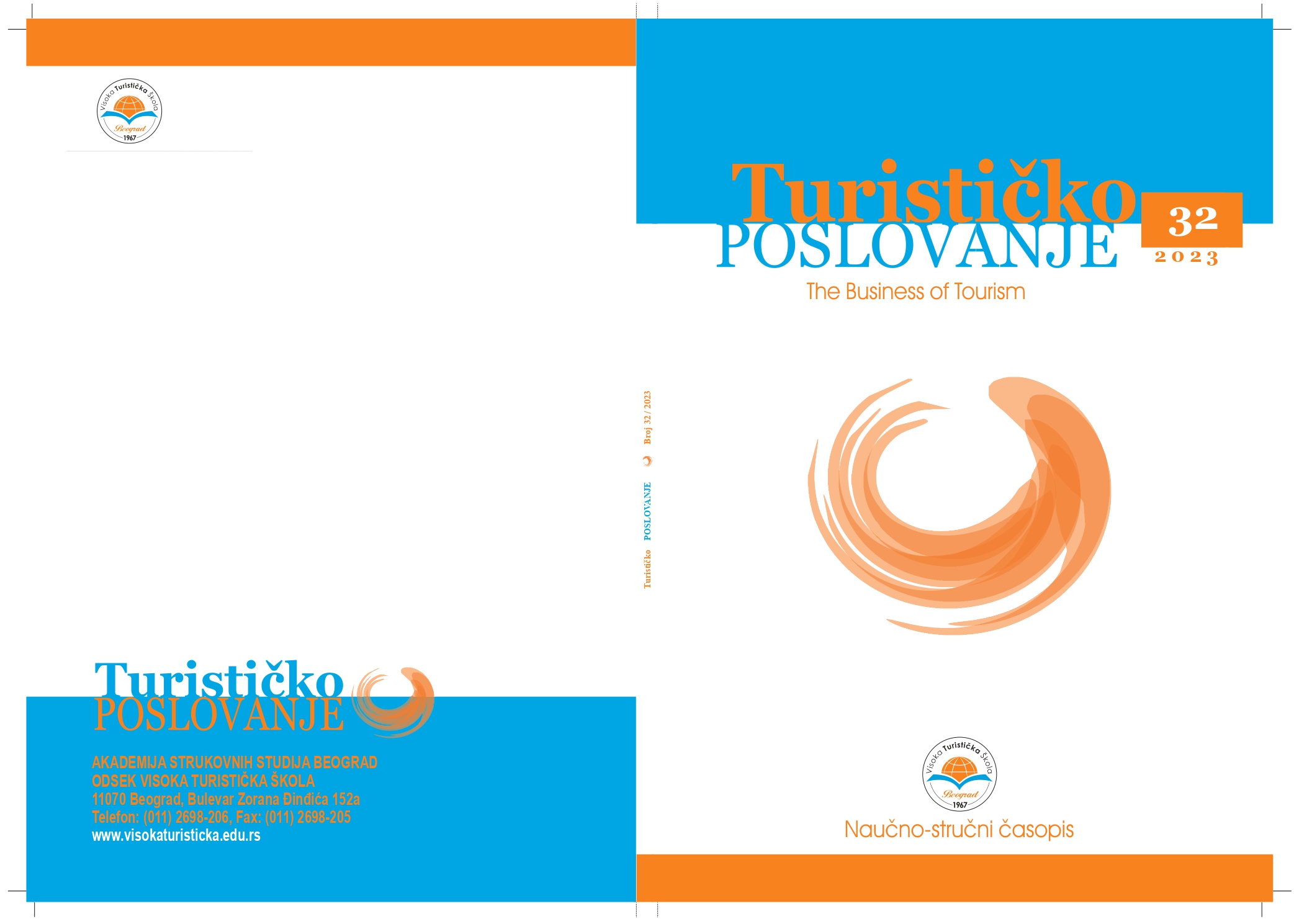THE INFLUENCE OF TRAVEL MOTIVES AND SOCIETY ON SATISFACTION WITH THE DESTINATION AND ACCOMMODATION AT THE DESTINATION
Abstract
The paper examines whether differences in the motives of travel as well as whether differences in society during the trip, as a closely related category with the motive of travel, have an impact on differences in the perception of satisfaction with the destination and accommodation at the destination. The research was conducted on the example of Vrnjačka Banja, as a tourist destination that is experiencing evolution and transformation from a spa destination of mass tourism to a wellness and spa luxury destination, which focuses on bleisure tourists. The research was conducted on a sample of 143 respondents who visited the destination in 2023. Research findings show that differences in travel motives affect satisfaction with the destination, as well as satisfaction with accommodation at the destination. On the other hand, the research did not find clear evidence that differences in society during the trip affect satisfaction with the destination, as well as satisfaction with accommodation at the destination.
References
2. Andrade-Suárez, M. & Caamaño-Franc, I. (2020). Тhe relationship between industrial heritage, wine tourism, and sustainability: a case of local community perspective. Sustainability, 10(503), 1-26.
3. Blal, I. & Sturman, M. (2014). The Differential Effects of the Quality and Quantity of Online Reviews on Hotel Room Sales. Cornell Hospitality Quarterly, 55, 365-375.
4.
5. Čvacić, S., Ćurčić, N., Radivojević, N., (2023). Kvalitet gastronomskih maifestacija u funkciji jačanja brenda turističke destinacije, Ekonomija: teorija i praksa, 16(4), in printing.
6. Filipović, N., (2023). Determinante konkurentnosti Aranđelovca i Topole kao turističke destinacije. Doktorska disertacija. Vrnjačka banja: Fakultet za hotelijerstvo i turizam u Vrnjačkoj banji.
7. Filipović, N., Makuljevic, Đ., Radivojevic, N., (2023). Examining the dynamic evaolution and comepetitiveness of Arandjelovac and Topola as tuoirs destination, International Review, in printng.
8. Hernández, A.B., Campa, F., Sánchez, M.V. (2012). Categorizing the Spanish accommodation sector: Does firm size influence economic profitability? Cornell Hospitality Quarterly 53(3), 257-264.
9. Lakićević, M. (2019). Ekonometrijski pristup modeliranju turističke ponude i tražnje. Vrnjačka Banja: Fakultet za hotelijerstvo i turizam u Vrnjačkoj Banji, Univerzitet u Kragujevcu.
10. Makuljević, Đ., Radivojević, N., Filipović, N., (2023). Uticaj Lovefesta na imidž i brend turističke destinacije Vrnjačka Banja, Working paper.
11. Öter, Z. (2011). Tourism and generation Y. Annals of Tourism Research, 32(2), 729-731.
12. Pavlović, M., Radivojević, N., & Lazić, J. (2009). Sustainable development of spa tourism in Serbia. Industrija, 37(2), 37-57.
13. Pimić, .M, (2023). Kvantifikovanje uticaja ključnih faktora uspeha poslovanja hotela u Republici Srbiji. Doktorska disertacija. Novi Sad: Fakultet za ekonomiju i inženjerski menadžment, Univerzitet Privredna Akademija.
14. Pimić, M., Marković, Z., Dinić, G., & Radivojević, N., (2023). Determinante uspeha poslovanja hotela - studija slučaja Republika Srpska. Ekonomija – teorija i praksa, 16(2), 151-176.
15. Radivojevic, N., Jovanovic, R., Pimic, M., Cvjetkovi, M., & Cvjetkovi, M. (2023). The impact of satisfaction with the care of employees on performance by food industry employees: case study the Republic of Serbia. Working paper.
16. Takahashi, T. & Toshie, T. (2016). Japanese Youth and Mobile Media. Working paper.
17. TripAdvisor (2014).
www.tripadvisor.co.uk/TripAdvisorInsights/n2120/24-insights-shape-your-tripadvisor- strategy,
preuzeto 17.08.2023. godine
18. Yang, Z., Yin, M., Xu, J. & Lin, W. (2019). Spatial evolution model of tourist destinations based on complex adaptive system theory: A case study of Southern Anhui, China. Journal of Geographical Sciences, 29(8), 1411-1434.

